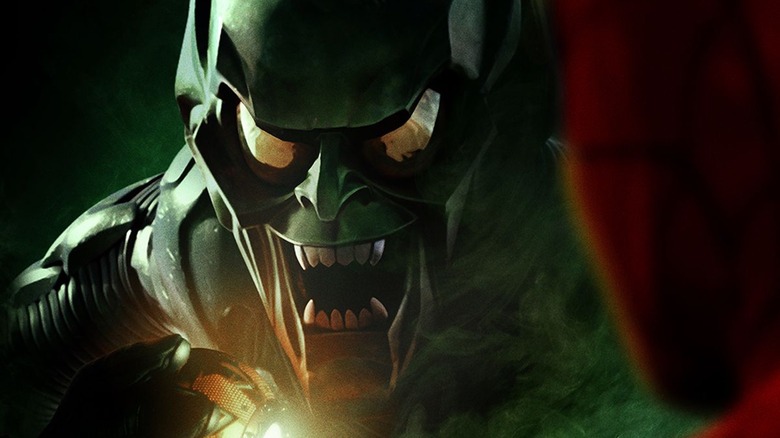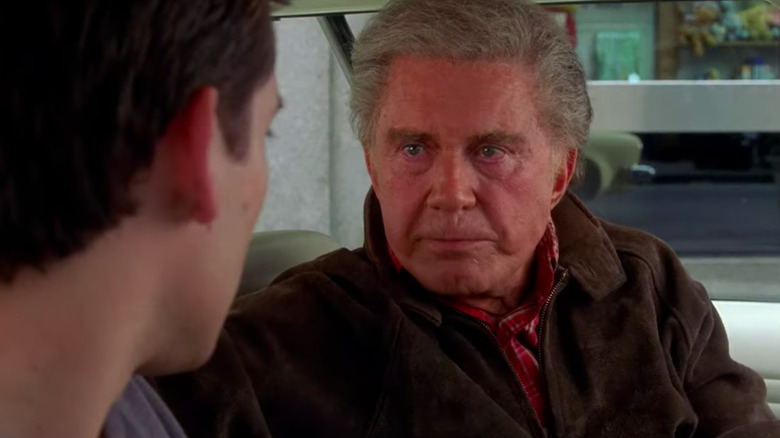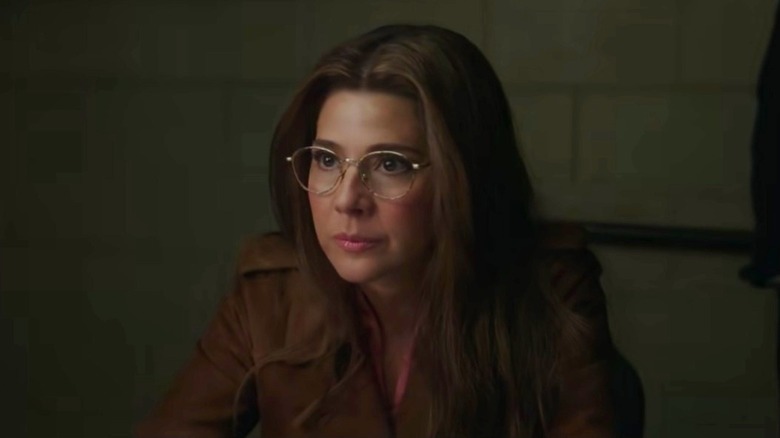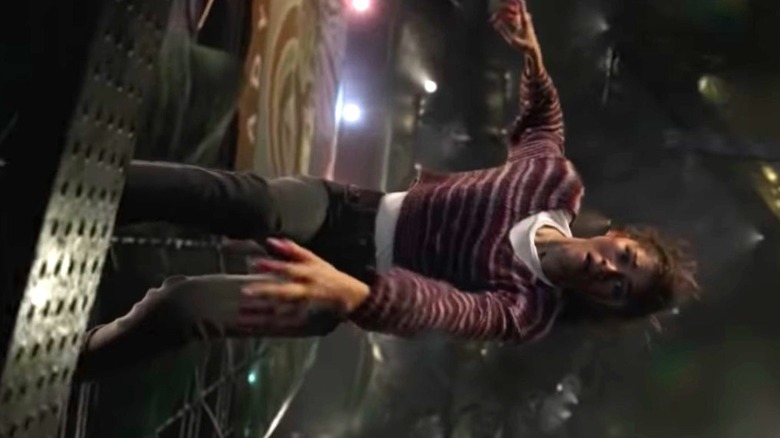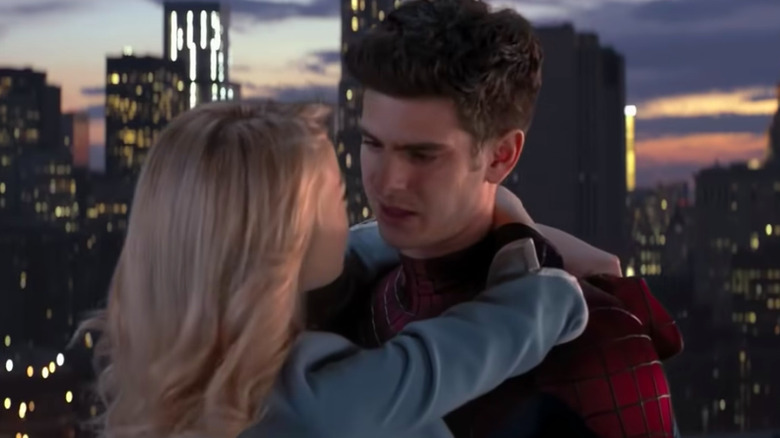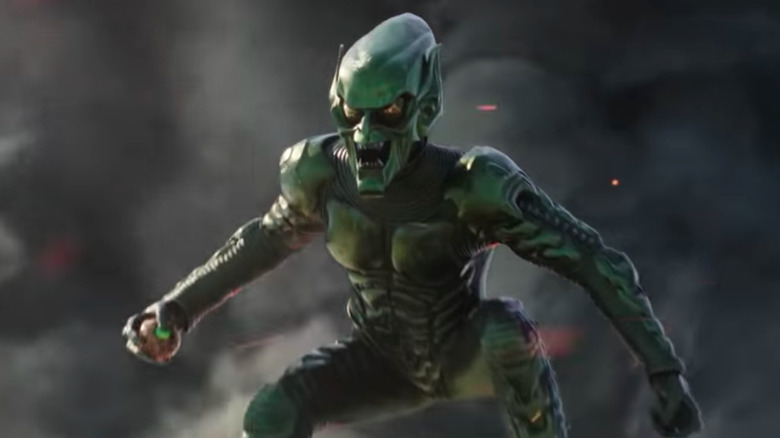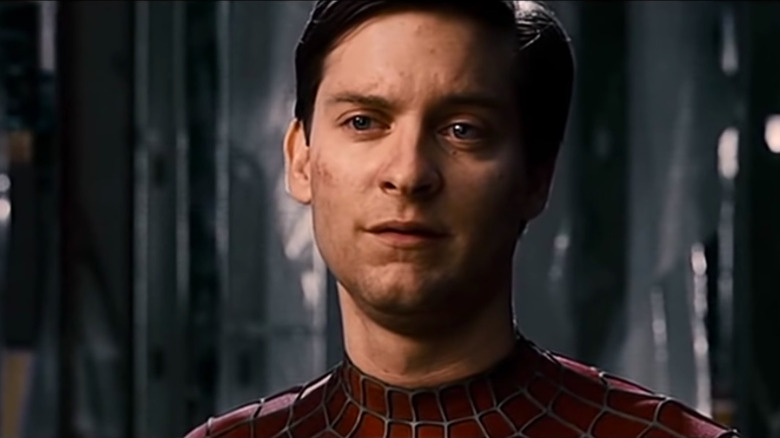Spider-Man: No Way Home's Biggest Nods To The Previous Spider-Man Movies
SPOILER ALERT! There are major spoilers ahead for "Spider-Man: No Way Home."
The latest Marvel Cinematic Universe film, "Spider-Man: No Way Home" is the third in the franchise's series focused on the wall-crawler. But Tom Holland isn't the only actor portraying Peter Parker and his webslinging alter-ego in the movie. That's because "No Way Home" doesn't only move Peter Parker's and the MCU's story as a whole forward, it also serves as a mashup of Spidey series past and present. The plot involves the multiverse, enabling villains from the other two "Spider-Man" movie franchises from recent history to appear in the film. But it isn't just those film's big bads that take a trip to the MCU — Tobey Maguire, who played Spider-Man in the 2002 through 2007 Sam Raimi-directed "Spider-Man" trilogy, and Andrew Garfield, who played Spider-Man in the Marc Webb-directed "The Amazing Spider-Man" in 2012 and its 2014 sequel, also reprise their roles in the new movie.
This gives Holland's younger Peter Parker the opportunity to bond and trade notes with his older and wiser counterparts, and it gives Maguire's and Garfield's more seasoned Peters the chance to discuss some of the most well-known moments from their films. However, the latest "Spider-Man" outing goes beyond mere reminiscence; it also revisits and puts a distinctly MCU spin on classic moments from the five non-MCU "Spider-Man" films. These are "No Way Home"'s biggest nods to the previous "Spider-Man" movies.
With great power...
If there's one thing "Spider-Man" has taught us in both his comics and his movies, it's that "with great power comes great responsibility." It's a phrase most often associated with Peter Parker's Uncle Ben, and it became a pop culture touchstone when the character (Cliff Robertson) uttered the line to Peter's newly superpowered teenager in "Spider-Man." While "The Amazing Spider-Man"'s Uncle Ben (Martin Sheen) doesn't say those exact words, he also emphasizes that Peter needs to prioritize fulfilling his responsibilities.
However, the famous remark wasn't repeated in the first two movies of the MCU's "Spider-Man" trilogy, at least partially because, while the MCU's Aunt May (Marisa Tomei) is Peter's guardian, she isn't married, so the movies have no Uncle Ben to bring the phrase to life. But in "No Way Home" the familiar words are movingly revisited.
When Green Goblin realizes his alter-ego Norman Osborn (Willem Dafoe) is working to eradicate him with the help of Peter, he takes over Osborn's body and attacks Peter and Aunt May. After a brutal fight in which the villain escapes and the apartment building they're in is ripped apart, Peter and Aunt May reunite in the building's lobby. Despite the destruction and the fact that they've both been injured, when Peter questions whether he should have tried to help Osborn, Aunt May — who was his inspiration for doing so in the first place — reassures Peter he did the right thing and poignantly recites the famous observation.
A terrible tragedy
Peter's actions have never led to the death of a loved one in the MCU, but the same can't be said for his predecessors. Instead of listening to Uncle Ben's pronouncement about responsibility in Raimi's "Spider-Man" and Webb's "The Amazing Spider-Man," both Peters choose the wrong path. While the circumstances are different, in each film, Peter lets a thief escape. Shortly afterwards, the thief shoots and kills Uncle Ben. In both cases, had Peter used his burgeoning superpowers to stop the thief, Ben's fate could have been different.
On the other hand, although the MCU's Peter has suffered through the loss of Tony Stark and the trauma of being erased from existence by Thanos, he's never regretted a decision he made the same way Maguire's and Garfield's characters have. That changes to some extent after he finds Aunt May following his battle with Green Goblin.
Initially, he and May believe they've both suffered only minor injuries. So when May tells Peter he has a responsibility to help others, including Norman Osborn, he takes the advice to heart. He is distracted, though, when May collapses and tragically succumbs to an unnoticed wound in her abdomen in a loose reinterpretation of Uncle Ben's demise. Unlike "No Way Home"'s other Peters, however, this Peter was genuinely trying to help the film's villains by fixing what made them go bad. And after May's death he becomes even more committed to following through on this mission.
MJ falls from a great height
One of the most famous arcs in comic book history is 1973's "The Night Gwen Stacy Died," in which Spider-Man fails to save his girlfriend after she's thrown off a bridge by the Green Goblin. It's a plot line that's been loosely adapted in both 2002's "Spider-Man," where Mary Jane Watson (Kirsten Dunst) stands in for Gwen, and 2014's "The Amazing Spider-Man 2." In contrast to the comics, Peter saves Mary Jane in the former film, however Peter fails to rescue Gwen (Emma Stone) in the latter film. It's a devastating loss that Garfield's character makes clear he has never quite recovered from in "No Way Home."
Saving his girlfriend from plummeting to her death is yet another thing the MCU's Spider-Man hasn't experienced in his first two films, perhaps because it wasn't until the end of his second film, "Spider-Man: Far From Home" that Peter even manages to get together with his crush MJ (Zendaya). Still accidents tend to happen when you're fighting on scaffolding by the Statue of Liberty, as the trio of Spider-Men do in the climax of "No Way Home."
While it's the superheroes who go into battle, MJ and Ned (Jacob Batalon) standby from a magical portal. But when new spellcaster Ned can't close the portal, Lizard (Rhys Ifans) attacks and forces MJ onto the scaffolding where she's knocked off the edge. And like Garfield's character, Holland's Spider-Man dashes after her but is unable to reach her.
A Spider-Man redeemed
For a moment before realizing she's dead in "The Amazing Spider-Man," Garfield's Peter believes he's saved Gwen after he catches her with a web inches from the ground of the clocktower where she fell. Unfortunately, whether because she hit her head of the floor or her neck snapped after her fall is abruptly stopped short, Gwen doesn't survive. And either way, Peter blames himself for what happens. In "No Way Home," Garfield's Peter reveals a deep insecure streak that seems to at least partially be the result of what happened to Gwen. Yet, the movie also gives the character the opportunity to redeem himself for what he sees as his greatest failure.
When Holland's Peter is unable to save MJ after she's knocked off the scaffolding around the Statue of Liberty during the film's final battle, it potentially sets the stage for a tragic outcome. Luckily, the MCU's Peter isn't the only Spider-Man around. After seeing MJ is in trouble and the MCU's Peter has failed to get to her, Garfield's Spider-Man swoops in and catches her. It's a moment that mirrors what happened to Gwen but has a very different result, and therefore enables Garfield's Spider-Man to correct a major sin of his past — and perhaps to return to his universe as a more confident and capable superhero.
Desire for deadly revenge
Of all the webslingers who appear in "No Way Home," it's Holland's character who's racked up the most on-screen superhero battles. His impressive experience is the result of starring in three of his own movies as well as "Captain America: Civil War," "Avengers: End Game," and "Avengers: Infinite War." Despite going up against a plethora of foes, however, the MCU's Spider-Man has never used his powers to get revenge on someone.
Yet, once again, this was a formative experience for Maguire's and Garfield's superheroes, who both attempted to use their powers to take down Uncle Ben's killer in their first films. While Garfield's character never found his uncle's murderer. Maguire's character pursued and confronted the thief who shot his uncle and, although Peter doesn't take him out, he is indirectly responsible for causing the man to fall out a window and plummet to his death.
After his Aunt May dies in "No Way Home," Holland's Peter is understandably distraught, but instead of revenge, he seems intent on honoring May by creating and administering cures to all the villains that have entered his reality from the multiverse. When he sees the Green Goblin during the battle at the Statue of Liberty, though, all of his hurt and rage overrides his good intentions and his desire for vengeance leads him to try to kill the supervillain instead.
Superhero morality
When the MCU's Spider-Man attacks Green Goblin during "No Way Home"'s climactic battle, his fury enables him to overpower the villain. And he's seconds away from killing for vengeance when Maguire's Peter stops him, ensuring Norman Osborn can be cured and go on to live a Green Goblin-free life.
Yet, the elder Spider-Man's actions could be seen as a nod to the character's hard-won experience and a sense of morality arising from his own mistakes. While, in "Spider-Man," Maguire's Peter goes after the man he thinks killed Uncle Ben and watches him die, when he discovers that Flint Marko was actually responsible for his uncle's murder in "Spider-Man 3," things go differently. Peter initially attacks Marko with an enraged passion because he's been infected by the Venom symbiote. However, after he separates himself from the alien substance, Peter is able to hear Marko out, and ultimately ends up forgiving him for his actions.
It seems Maguire's Spider-Man has learned that vengeance isn't as satisfying as we think it will be. Consequently, in true superhero fashion, he stands up to his younger counterpart so he can prevent him from doing something he'll come to regret. Of course, the Green Goblin is still the Green Goblin so while Maguire's Spider-Man's back is turned to him, Green Goblin stabs him and the wall-crawler goes down. Fortunately, by then, Holland's character has snapped out of his violent anger. Even better, the wound isn't fatal. Besides, as he explains, he's "been stabbed before."
